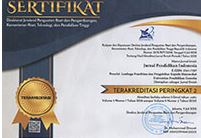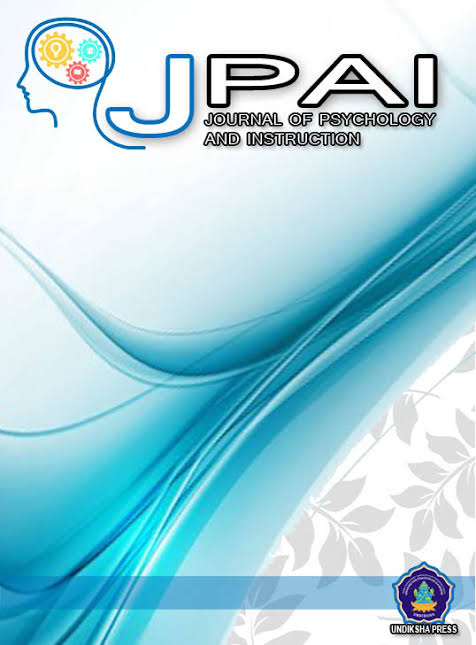The stimulation of sense of community on the early childhood’ online learning
DOI:
https://doi.org/10.23887/jpai.v5i1.34982Keywords:
Sense of Community, Stimulation in Early Childhood Education, Teachers Performance, Online LearningAbstract
The change of conventional learning into online learning process due to COVID-19 pandemic had brought a significant change towards sense of community stimulation. Direct learning activities are needed considering that the early childhood education progress emphasize sense experiences in which a direct interaction between teachers and students. A dynamic interaction could improve roles as a part of society (sense of community). It was designed in the form of descriptive quantitative to find out a clear picture about the sense of community stimulation conducted by the teachers of The Early Childhood Education Program in North Denpasar, Bali. Proportional random sampling was used to choose the participants. Questionnaire was the instruments used in this study in which it was spread by using Google Form. The data were analysed quantitatively by using statistical descriptive in the percentage form. The findings showed that sense of community stimulation done by the early childhood teachers was positive in the percentage of 85,94 %. The other results were viewed from four indicators such as; teachers’ knowledge categorized as positive (79,59%), the sense of community stimulation strategy in the positive category categorized in strongly positive (86,52%), the sense of community stimulation’s planning, strategy categorized into strongly positive, and the collaboration and enrichment were strongly positive (92,16%).
References
Barrera, M. (2000). Social support research in community psychology. In J. Rappaport & E. Seidman (Eds.), Handbook of community psychology (pp.215–245). New York: Plenum Press. Retrieved from https://doi.org/10.1007/978-1-4615-4193-6_10 DOI: https://doi.org/10.1007/978-1-4615-4193-6_10
Effendy, O.U. (2008). Dinamika Komunikasi. Bandung: PT. Remaja Rosdakarya.
Farrell, S. J., Aubry, T., & Coulombe, D. (2004). Neighbourhoods and neighbours: Do they contribute to personal wellbeing?. Journal of Community Psychology, 32(1), 9-25. Retrieved from https://doi.org/10.1002/jcop.10082 DOI: https://doi.org/10.1002/jcop.10082
Freeman, J., & Munandar, U. (2000). Cerdas dan cemerlang (Sumantri, B. & Singgih, E., Trans). Jakarta: PT. Gramedia Pustaka Utama.
Gagne, M. (2003). The role of autonomy support and autonomy orientation in prosocial behavior engagement. Journal of Motivation and Emotion, 27(3), 199-223. Retrieved from https://doi.org/10.1023/A:1025007614869 DOI: https://doi.org/10.1023/A:1025007614869
Gusman & Khadijah. (2020). Pola Kerja Sama Guru dan Orangtua Mengelola Bermain AUD Selama Masa Pandemi COVID-19. Jurnal Kumara Cendekia. Retrieved from https://doi.org/10.2096/kc.v8i2.41871 DOI: https://doi.org/10.20961/kc.v8i2.41871
Graziano, W. G., & Eisenberg, N. (2007). Agreeableness: A dimension of personality. dalam R. Hogan, S. Briggs, & J. Johnson (1997) (Eds.), Handbook of personality psychology. San Diego: Academic Press DOI: https://doi.org/10.1016/B978-012134645-4/50031-7
Hakim, M. S. H. I. (2020). Implementasi Kolaborasi Orang Tua dan Guru Dalam Pelaksanaan Pembelajaran Daring Pada PAUD. JIEES : Journal of Islamic Education at Elementary School. , 1(1), 26-33.
http://doi.org/10.47400/jiees.v1i1.8 DOI: https://doi.org/10.47400/jiees.v1i1.8
Hussain, S., Abbas, M., Shahzad, K., & Bukhari, S. A. (2012). Personality and career choices. Journal of Business Management, 6(6), 2255-2260. Retrieved from https://doi.org/10.5897/AJBM11.2064 DOI: https://doi.org/10.5897/AJBM11.2064
Mashfufah, & Rohmati, S. (2019). Persepsi Guru Taman Kanak-Kanak (TK) Terhadap Kemampuan Perkembangan Kognitif Sebagai Aspek Penting Dalam Kesiapan Bersekolah Anak. Bandung: Jurnal Ilmu Pendidikan dan Pengajaran, Vol.6 No.3. Retrieved from http://doi.org/10.17509/edusentris.v6i3.494
Mcmillan, D. W., & Chavis, D. M. (1986). Sense of community: A Definition and Theory. Journal of Community Psychology. 14(1), 6-23. https://doi.org/.10.1002/1520-6629(198601)14:1<6::AID-JCOP2290140103>3.0.CO;2-1 DOI: https://doi.org/10.1002/1520-6629(198601)14:1<6::AID-JCOP2290140103>3.0.CO;2-I
Nur, A. & Sutoyo, A. (2016). Peran Orangtua dalam Memotivasi Belajar Siswa. Semarang. Indonesian Journal of guuidnce And Counseling. Vol. 5, No. 4. Retrieved from https://doi.org/10.15294/IJGC.V5I4.13520
Penner, L. A., Dovidio, J. F., Piliavin, J. A., & Schroeder, D. A. (2005). Prosocial behavior: Multilevel perspectives. Annual Review of Psychology, 56, 365-392. DOI: https://doi.org/10.1146/annurev.psych.56.091103.070141
Pooley, J.A., Breen, L., Pike, L.T., Drew, N.M. & Cohen, L. (2008). Critiquing the school community: A qualitative study of children’s conceptualisations of their school. International Journal of Qualitative Studies in Education, 21, 87–98. DOI: https://doi.org/10.1080/09518390701207517
Rachman & Cahyani, I. (2019). Perkembangan Keterampilan Sosial Anak Usia Dini. Jurnal Pendidikan Raudhatul Athfal. Retrieved from https://doi.org/10.15575/japra.v2i1.5312 DOI: https://doi.org/10.15575/japra.v2i1.5312
Rahmadhan Umar, M.F. & Suryanto. (2019). Sense of community pada Komunitas Yourraisa Surabaya. Universitas Airlangga. Jurnal Psikologi: Media Ilmiah Psikologi. Retrieved From https://doi.org/10.47007/jpsi.v17i2.52
Sudrajat, C. J., Agustin, M., Kurniati, L., & Karsa, D. (2021). Jurnal Obsesi : Jurnal Pendidikan Anak Usia Dini Strategi Kepala TK dalam Meningkatkan Mutu Pendidikan pada Masa Pandemi COVID-19 Abstrak. Jurnal Obsesi : Jurnal Pendidikan Anak Usia Dini, 5(1), 508–520. Retrieved From https://doi.org/10.31004/obsesi.v5i1.582 DOI: https://doi.org/10.31004/obsesi.v5i1.582
Sugiyono. (2013). Statistika untuk Penelitian. Bandung: Alfabeta
Devi, A.T., Yusuf, M., & Hardjono. (2017). “The Relationship Between Sense Of Community And Agreeableness With Prosocial Behavior Among Member Of Young On Top (YOT)”. Journal of ICSAR. 1(1). Retrieved From http://dx.doi.org/10.17977/um005v1i12017p006 DOI: https://doi.org/10.17977/um005v1i12017p006
Witten, K., McCreanor, T. & Kearns, R. (2007). The place of schools in parents’ community belonging. New Zealand Geographer, 63(2), 141–148. DOI: https://doi.org/10.1111/j.1745-7939.2007.00097.x










